| Srl | Item |
| 1 |
ID:
047568
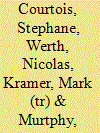

|
|
|
|
|
| Publication |
Cambridge, Harvard University Press, 1999.
|
| Description |
xx, 858p.
|
| Standard Number |
0674076087
|
|
|
|
|
|
|
|
|
|
|
|
Copies: C:1/I:0,R:0,Q:0
Circulation
| Accession# | Call# | Current Location | Status | Policy | Location |
| 043549 | 320.532/STE 043549 | Main | On Shelf | General | |
|
|
|
|
| 2 |
ID:
108004


|
|
|
| 3 |
ID:
061150
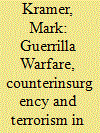

|
|
|
| 4 |
ID:
087088
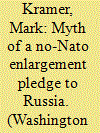

|
|
|
|
|
| Publication |
2009.
|
| Summary/Abstract |
In the latter half of the 1990s, as the North Atlantic Treaty Organization (NATO) was preparing to expand its membership for the first time since the admission of Spain in 1982, Russian officials claimed that the entry of former Warsaw Pact countries into NATO would violate a solemn ''pledge'' made by the governments of West Germany and the United States in 1990 not to bring any former Communist states into the alliance.1 Anatolii Adamishin, who was Soviet deputy foreign minister in 1990, claimed in 1997 that ''we were told during the German reunification process that NATO would not expand.'' Other former Soviet officials, including Mikhail Gorbachev, made similar assertions in 1996-1997
|
|
|
|
|
|
|
|
|
|
|
|
|
|
|
|
| 5 |
ID:
138183
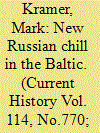

|
|
|
|
|
| Summary/Abstract |
In late February and March 2014, shortly after the violent overthrow of Ukrainian President Viktor Yanukovych, Russian President Vladimir Putin sent troops to occupy the Crimean Peninsula, which had long been part of Ukraine. Putin’s subsequent annexation of Crimea sparked a bitter confrontation with Western governments and stoked deep anxiety in Central and Eastern Europe about the potential for Russian military encroachments elsewhere. Nowhere has this anxiety been more acute than in Poland and the three Baltic countries—Lithuania, Latvia, and Estonia—where fears have steadily mounted as Russia has helped to fuel a civil war in eastern Ukraine while undertaking a series of military provocations in the Baltic region.
|
|
|
|
|
|
|
|
|
|
|
|
|
|
|
|
| 6 |
ID:
060740
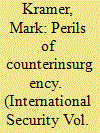

|
|
|
|
|
| Publication |
Winter 2004-05.
|
|
|
|
|
|
|
|
|
|
|
|
|
|
|
|
| 7 |
ID:
106603
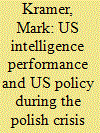

|
|
|
|
|
| Publication |
2011.
|
| Summary/Abstract |
Drawing on intelligence documents that were recently declassified, this article assesses the quality of US intelligence analysis during the 1980-81 Polish crisis and the impact of the intelligence analysis on US policy toward Poland and the Soviet Union. After discussing the value and limitations of the declassified materials, the article raises questions about US policy during the crisis and discusses how intelligence inputs helped to shape policy. The newly available documents confirm that the US intelligence community's analytical products were often deficient and that these shortcomings put a crimp on US policymakers' choices.
|
|
|
|
|
|
|
|
|
|
|
|
|
|
|
|